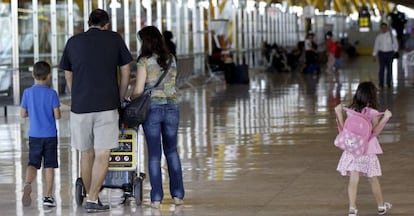Spanish air traffic controllers start four days of strikes
No agreement reached between union and employer over sanctions for staff members Stoppages will take place in two-hour blocks during morning and afternoon shifts

Air traffic controllers from Enaire, the company that manages air navigation in Spain, are due to start four days of partial strikes today. The Public Works Ministry has set minimum service levels at 70% for the stoppages, which could affect up to 5,300 flights, nearly a quarter of the total forecast for Spanish airspace over June 8, 10, 12 and 14.
The stoppages will take place for two-hour periods during morning and afternoon shifts, from 10am to 12pm, and 6pm to 8pm.
According to Enaire, a total of 5,330 flights are due to enter or leave Spanish airspace on Monday
The strike will be the first of its kind in Spain in 26 years.
The protest has been called by the Air Traffic Controllers Union (USCA), which represents 90% of the country’s controllers. The reason for the industrial action is the decision made by Enaire to suspend 61 controllers from Barcelona without pay for a month as punishment for their involvement in an unprecedented wildcat strike in December 2010 that completely shut down Spanish airspace.
The walkout had its origins in a decree passed by the previous Socialist government of Prime Minister José Luis Rodríguez Zapatero on December 3, 2010 that significantly increased controllers’ working hours at the same time as it lowered their salaries by a claimed 30 percent. The action took the form of an avalanche of staff calling in sick as a result of alleged “anxiety and psychological pressure.”
According to Enaire, a total of 5,330 flights are due to enter or leave Spanish airspace on Monday. Of these, 700 will coincide with the 10am to 12pm stoppage, and another 600 between 6pm and 8pm – a total of 1,300 flights.
USCA confirmed on Friday that the strike would be going ahead, given that negotiations with Enaire had not progressed. The two sides were also unable to agree on the minimum services they would be offering, given that, USCA claims, the level set by the Public Works Ministry does not respect the rights of workers. The air traffic controllers would, they said, “meet with them scrupulously.”
The union has said that it is unable to understand the Enaire sanctions, given that judicial probes into the wildcat strikes in 20 courts across Spain “have concluded overwhelmingly that there was no disobedience on the part of the controllers, nor did they abandon their posts.” What’s more, Enaire is refusing to rehire an air traffic controller from Santiago de Compostela, Marco Antonio Enríquez, who was fired by the company as a result of the events in 2010. A court ruling, however, found that the sacking was “based on unreal facts.”
There are ongoing court cases against air traffic controllers in Madrid – where a judge has found evidence of a possible crime of sedition, punishable by up to six years in prison, in the actions of 113 controllers and eight members of the board of USCA – and in Palma de Mallorca. In both cases, the union trusts that the court actions will be shelved.
The union has stated that it is not ruling out continuing with the stoppages if Enaire does not change its stance. However, it has also said that it will continue to negotiate over the following days with the aim of reaching a solution that will bring the strike to an end.
Tu suscripción se está usando en otro dispositivo
¿Quieres añadir otro usuario a tu suscripción?
Si continúas leyendo en este dispositivo, no se podrá leer en el otro.
FlechaTu suscripción se está usando en otro dispositivo y solo puedes acceder a EL PAÍS desde un dispositivo a la vez.
Si quieres compartir tu cuenta, cambia tu suscripción a la modalidad Premium, así podrás añadir otro usuario. Cada uno accederá con su propia cuenta de email, lo que os permitirá personalizar vuestra experiencia en EL PAÍS.
¿Tienes una suscripción de empresa? Accede aquí para contratar más cuentas.
En el caso de no saber quién está usando tu cuenta, te recomendamos cambiar tu contraseña aquí.
Si decides continuar compartiendo tu cuenta, este mensaje se mostrará en tu dispositivo y en el de la otra persona que está usando tu cuenta de forma indefinida, afectando a tu experiencia de lectura. Puedes consultar aquí los términos y condiciones de la suscripción digital.








































